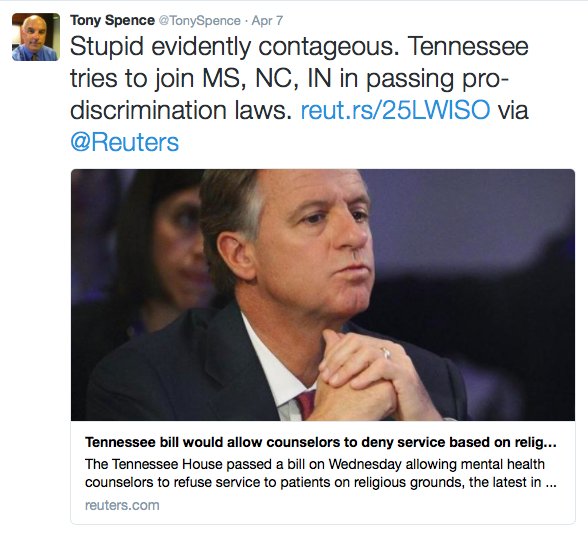John Gehring, Catholic program director at Faith in Public Life and author of The Francis Effect, has just written a response to the recent forced resignation of Tony Spence, former editor-in-chief of Catholic News Service, following several tweets critical of anti-LGBT legislation in Tennessee. His resignation came at the request of the U.S. Conference of Catholic Bishops.
The story, in Commonweal Magazine, examines the relationship among the Conference, the Catholic Church, activists and Pope Francis, stating that the Catholic focus on issues including abortion, marriage and euthenasia to the exclusion of issues of poverty and inequality have created an environment where bloggers and advocacy groups have successfully pressured the removal of Spence and where theological and political inflexibility have begun to the prevent the Church from doing substantial work and building effective partnerships.
Spence, who in 2010 won the top award given by the Catholic Press Association and has been a consultant in the past to the Pontifical Council for Social Communications, said he was “shocked” to be forced out and told to immediately leave his post without the chance to address his colleagues. “I’ve heard from staff and from people all over creation. There’s been a lot of support,” he said. The former editor has observed a growing tension and anxiety among some Catholic leaders. “I think it’s a very tense time in the American church and some things are off limits for discussion in any kind of rational way,” Spence said. “It’s difficult to talk about religious liberty, sexuality, women’s issues. But we don’t live in a Catholic bubble. We’re a country of 320 million people.”
The forced resignation of a widely respected journalist with a long history of serving the Catholic press raises questions about the larger, systemic changes at the USCCB in recent years. Interviews with former conference officials confirm that a shift in culture and priorities at the Washington, D.C., headquarters has taken place, and the changes have been especially notable in the midst of Francis’s reform-and-renewal papacy. The pope’s major U.S. appointments—Archbishop Blase Cupich in Chicago and Bishop Robert McElroy in San Diego—signaled a desire to nudge the American hierarchy away from the culture wars. Some leaders at the bishops’ conference seem resistant to this new way forward.
The Conference has not ignored issues beyond the ones prominent in American media; 1986 saw the release of a pastoral letter, Economic Justice for All. In 2012, conflicts and debate just after the Conference launched “a national religious freedom campaign in protest of Obamacare’s contraception mandate” caused the failure of a second statement, whose working title was The Hope of the Gospel in Difficult Times.
The document’s demise underscored generational and ideological fissures in the hierarchy. Older bishops, many of whom grew up in working-class families with strong union ties, panned the statement for its failure to address— through the lens of traditional Catholic social teaching—the structural causes of poverty or offer a compelling response to growing inequalities and assaults on workers’ rights.
Gehring’s conclusion:
The bishops’ conference, and the American hierarchy more broadly, face a crossroads. Culture warriors are digging in. Self-appointed guardians of orthodoxy will only grow more emboldened now that they can claim another scalp. There is nothing joyful, inspiring, or authentically Catholic about any of this. Catholics on the left and right don’t have to agree on everything to recognize a better path is possible. The ideological purity tests and ugly character assassinations that sicken our secular body politic should be a cautionary tale for our church.
Read the entire story online here.

